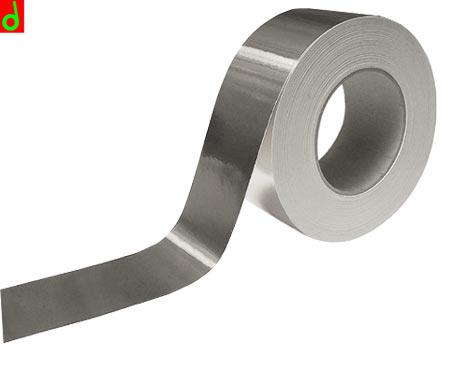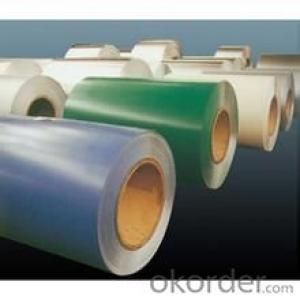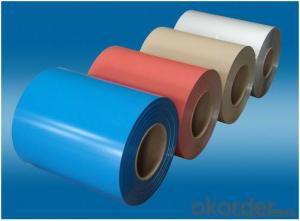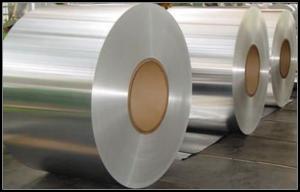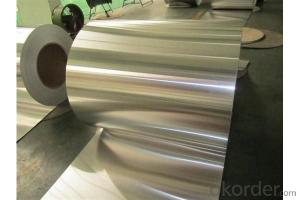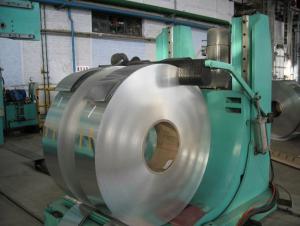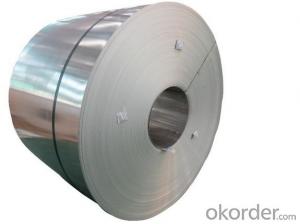Mastic Aluminum Coil for Foil Stock Sale
- Loading Port:
- China Main Port
- Payment Terms:
- TT OR LC
- Min Order Qty:
- -
- Supply Capability:
- -
OKorder Service Pledge
Quality Product, Order Online Tracking, Timely Delivery
OKorder Financial Service
Credit Rating, Credit Services, Credit Purchasing
You Might Also Like
Alloy: AA 8011
Temper:H14/16/18/22/24/32,HO etc.
Thickness:0.2mm—0.4mm
Width:200mm—2000mm (Can be slitted)
InnerDiameter: 508MM
CoilWeight:100kg
Application: Foil stock
- Q: What are the properties of aluminum coils?
- Aluminum coils possess several key properties that make them highly sought after in various industries. Firstly, aluminum coils have a high strength-to-weight ratio, meaning they are lightweight yet durable. This characteristic makes them ideal for applications where weight reduction is crucial, such as in the aerospace industry. Additionally, aluminum coils exhibit excellent corrosion resistance. The formation of a thin, protective oxide layer on the surface of the metal helps prevent further oxidation, making them suitable for outdoor and marine environments. This corrosion resistance also translates to a longer lifespan, reducing maintenance requirements and costs. Another important property of aluminum coils is their high thermal conductivity. This feature allows for efficient heat transfer and makes them well-suited for applications in the heating, ventilation, and air conditioning (HVAC) industry. Furthermore, aluminum coils have excellent electrical conductivity, making them favorable for use in electrical and electronic components. Aluminum coils are also highly malleable and ductile, allowing for easy shaping and forming. This versatility makes them a popular choice in manufacturing processes, such as in the production of automobile parts, cans, and packaging materials. Lastly, aluminum coils are known for their recyclability. They can be easily melted down and reused without compromising their quality, making them an environmentally friendly choice. This recyclability aspect aligns with the increasing focus on sustainability and reducing the environmental impact of various industries. In summary, aluminum coils possess properties such as high strength-to-weight ratio, corrosion resistance, thermal and electrical conductivity, malleability, and recyclability. These properties make them valuable in numerous applications across various industries.
- Q: Is it possible to use a soldering iron to fix a damaged or broken aluminum coil?
- <p>Using a soldering iron to repair an aluminum coil is not typically effective. Aluminum has a high thermal conductivity and doesn't bond well with solder, making it difficult to create a strong joint. Instead, consider using specialized aluminum welding techniques or brazing, which involves using a filler metal with a melting point higher than the base metal. For small repairs, you might also explore the use of aluminum repair epoxy or other adhesives designed for metal bonding. Always ensure to follow safety precautions and consult with a professional if the repair is complex or if the coil is part of a critical system.</p>
- Q: Can aluminum coils be fabricated or machined?
- Yes, aluminum coils can be fabricated or machined. They can be cut, shaped, and formed into desired shapes or sizes using various fabrication techniques such as cutting, bending, stamping, or welding. Additionally, machining processes like milling, drilling, or turning can be used to remove excess material and create intricate designs or features on aluminum coils.
- Q: What maintenance is required for aluminum coils?
- Maintenance for aluminum coils typically includes regular cleaning and inspection to ensure efficient performance and longevity. Here are some specific maintenance requirements for aluminum coils: 1. Cleaning: Regularly clean the aluminum coils to remove dirt, dust, and debris that can accumulate on the surface. Use a soft brush or a vacuum cleaner with a brush attachment to gently remove any loose particles. Avoid using abrasive cleaners or brushes that can scratch or damage the surface of the aluminum. 2. Inspection: Periodically inspect the aluminum coils for signs of damage or wear. Check for any bent or dented fins, which can restrict airflow and reduce the coils' efficiency. Look for signs of corrosion, such as discoloration or pitting, as this can affect the coils' performance and lifespan. 3. Coil Protection: Apply a protective coating or sealant to the aluminum coils to prevent corrosion and damage from exposure to moisture, chemicals, or harsh environmental conditions. This can help prolong the life of the coils and maintain their performance. 4. Lubrication: If your aluminum coils are part of a mechanical system, such as an HVAC unit, ensure that any moving parts are properly lubricated. This can help reduce friction and wear on the coils, improving their efficiency and preventing premature failure. 5. Professional Maintenance: Consider scheduling regular professional maintenance for your aluminum coils, especially if they are part of a larger system. HVAC technicians or specialized coil cleaning services can provide a thorough inspection, cleaning, and maintenance to ensure optimal performance and identify any potential issues early on. By following these maintenance practices, you can help extend the lifespan of your aluminum coils, improve their efficiency, and prevent costly repairs or replacements.
- Q: What is the acceptable range of temperatures for aluminum coils in terms of their functionality and durability?
- <p>The temperature range for aluminum coils can vary depending on the specific application and alloy type. Generally, aluminum coils can operate effectively within a range of -200掳F to 500掳F (-129掳C to 260掳C). For most industrial applications, the working temperature is between -40掳F to 300掳F (-40掳C to 150掳C). However, it's important to consult the manufacturer's specifications for the exact temperature limits of a particular aluminum coil, as these can differ based on the alloy and intended use.</p>
- Q: How is an aluminum coil made?
- Aluminum coil rolling, a manufacturing process, is responsible for the production of aluminum coils. The process comprises multiple stages. Initially, molten aluminum is poured into large molds, resulting in the formation of large ingots or billets. These ingots are then heated to increase their malleability. After heating, the ingots are transformed into thin strips through the utilization of heavy machinery called hot rolling mills. The ingots pass through a series of rollers, gradually reducing their thickness while simultaneously increasing their length. This continuous hot rolling guarantees uniform thickness and a smooth surface finish. Following hot rolling, the aluminum strips undergo cooling and subsequent processing. Cold rolling, which involves passing the strips through cold rolling mills, is commonly employed. Cold rolling further decreases the thickness of the aluminum strips, creating the desired gauge or thickness necessary for the final product. To enhance the mechanical properties and surface finish of the aluminum, the cold-rolled coils may undergo additional treatments such as annealing, tempering, or surface treatment. Annealing includes heating the coils to a specified temperature and gradually cooling them to alleviate internal stresses and improve their ductility. Tempering is a similar process, albeit conducted at a lower temperature than annealing. Once the desired properties are achieved, the aluminum coils are typically trimmed, cut, and packaged into coils or sheets, thereby becoming ready for distribution or further fabrication. These coils find extensive use in various industries, including construction, automotive, aerospace, and packaging. Their lightweight nature, corrosion resistance, and exceptional thermal conductivity contribute to their high demand.
- Q: How are aluminum coils tested for quality?
- Aluminum coils are tested for quality using a variety of methods to ensure they meet the required standards. One of the commonly used tests is the visual inspection, where trained personnel examine the coils for any visual defects such as scratches, dents, or surface imperfections. Another important test is the dimensional inspection, which involves measuring the thickness, width, and length of the coils using precision instruments. This ensures that the coils are manufactured within the specified tolerances. Additionally, mechanical tests are conducted to assess the strength and durability of the aluminum coils. These tests include tensile and yield strength tests, which measure the maximum load a coil can withstand before breaking or deforming. Bend tests are also performed to evaluate the flexibility and resistance to cracking. Furthermore, chemical composition analysis is conducted to verify the purity and consistency of the aluminum material. This is typically done using spectroscopy techniques, such as atomic absorption or emission spectroscopy, to determine the exact elemental composition of the coils. Surface coating tests are also carried out to assess the quality of any protective or decorative coatings applied to the aluminum coils. These tests include adhesion testing, corrosion resistance testing, and color consistency evaluation. In addition to these traditional tests, advanced non-destructive testing methods are employed to detect any internal defects or flaws in the coils. Techniques like ultrasonic testing, eddy current testing, or X-ray inspection are used to identify any hidden defects without damaging the material. Overall, a combination of visual, dimensional, mechanical, chemical, and non-destructive tests ensures that aluminum coils meet the required quality standards before they are used in various applications such as construction, automotive, or electronics industries.
- Q: What are the different sizes and dimensions of aluminum coils available?
- The sizes and dimensions of aluminum coils vary depending on the manufacturer and specific application. However, common sizes range from 0.2mm to 6mm in thickness and 100mm to 2000mm in width. Lengths can vary as well, typically ranging from a few meters to several hundred meters. These dimensions can be customized to meet specific project requirements.
- Q: Never put oil in the water. Oil keeps the pasta from absorbing the sauce. Also add a little of the pasta water 3 Tbs. to the sauce. This helps sauce to adhere to pasta. The best remedy for pasta sticking. Use an aluminum stock pot. (tall pan). I don't know why but this works. I have using this stock pot for pasta for 40 years. I've tried stainless, non-stick, etc. they all stick. Except for the Aluminum.1 lb. of pasta, 4 qts. of water. 1Tbs. saltTurn burner to high,keep it therebring to boil then boil for 3 minutes, add 1 TBS salt, add pasta. Stir slowly 2 minutes, until the water boils. Cook tender enough for a fork to cut through but still a little firm
- cool tip. thanks.
- Q: What are the common safety precautions when working with aluminum coils?
- To ensure the safety of individuals and prevent accidents, it is crucial to follow several safety precautions when handling aluminum coils. Here are some commonly recommended safety measures: 1. Personal Protective Equipment (PPE): It is essential to wear appropriate safety gear, such as safety goggles, gloves, and aprons, while working with aluminum coils. This protective equipment is necessary to safeguard against potential injuries from sharp edges, cuts, or burns. 2. Proper Handling Techniques: To avoid strain or injury, it is important to use proper lifting techniques while handling aluminum coils. Since these coils can be heavy, lifting with your legs instead of your back and using lifting aids or equipment, if required, is crucial. 3. Secure Storage: To prevent any accidents, it is vital to securely store aluminum coils. Avoid stacking them too high to prevent them from falling or rolling over and causing injuries. 4. Adequate Ventilation: To prevent the buildup of fumes or dust particles, it is important to ensure that the work area has proper ventilation. Aluminum coils may release harmful particles or gases during cutting or processing, making proper ventilation necessary for maintaining a safe working environment. 5. Fire Safety: Due to the high flammability of aluminum, it is extremely important to avoid sparks or open flames near aluminum coils. Using non-sparking tools and refraining from smoking or using flammable materials in the vicinity is crucial. 6. Sharp Edges: It is important to be cautious of sharp edges on aluminum coils as they can cause cuts or lacerations. Handling coils with care and using appropriate tools can help mitigate the risk of injury. 7. Training and Safety Guidelines: All personnel working with aluminum coils should receive proper training on handling procedures and safety guidelines. This includes knowing how to correctly use equipment, understanding emergency procedures, and being aware of any specific hazards associated with aluminum coil handling. 8. Regular Maintenance: Regularly maintaining equipment and tools is necessary to ensure they are in good working condition. This involves inspecting and repairing any damaged or worn-out parts that could pose a safety risk. 9. First Aid and Emergency Response: Keeping a well-equipped first aid kit nearby and ensuring that employees are aware of its location is important. Additionally, establishing clear emergency response protocols and training employees on what to do in case of an accident or injury is crucial. By following these common safety precautions, individuals can minimize the risks associated with working with aluminum coils and create a safer working environment.
Send your message to us
Mastic Aluminum Coil for Foil Stock Sale
- Loading Port:
- China Main Port
- Payment Terms:
- TT OR LC
- Min Order Qty:
- -
- Supply Capability:
- -
OKorder Service Pledge
Quality Product, Order Online Tracking, Timely Delivery
OKorder Financial Service
Credit Rating, Credit Services, Credit Purchasing
Similar products
Hot products
Hot Searches
Related keywords



